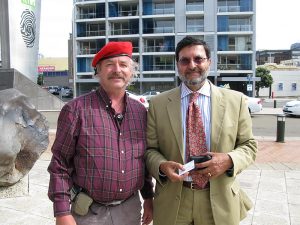By Nick Smith
(can be seen at http://www.whyprohibition.ca/blogs/ellis-worthington/drug-bans-are-bad-economics )
Originally published on Stuff, July 17, 2009
The most convincing evidence of the harm caused by the criminalisation of party pills in April last year comes from a recently convicted drug dealer. (actually it was quite the opposite, a four-fold increase in sales and no perceptable increase in harm, but then that’s MDMA for you. Millions of ‘E’ experiences in the UK, every week, problems at best are ‘associated with use’ while no benefits of displacement of other drugs, like alcohol, are measured)
This man, whose name is suppressed, admitted smuggling 100,000 ecstasy tablets in just three months. He told media that his small operation became massive almost overnight after the government banned party pills, which contain the active ingredient benzylpiperazine (BZP).
The ban was instituted despite an investigation showing BZP caused little harm to users. BZP is not like methamphetamine, which in its crystalised form is called P, and ecstasy. The criminal acts and damage caused by P addicts have filled news pages for months. Ecstasy, while less harmful, has been implicated in several deaths.
When the ban became law, people switched from taking safer party pills to the much more dangerous methamphetamine and ecstasy.
“I went from selling 5000 pills a month to 5000 pills a week,” the 52-year-old drug dealer explained to a weekend newspaper about the financial impact to his operation of the ban, which he estimated had generated up to $12 million in revenue.
Even the medical profession concedes the BZP ban is fanning greater recreational use of more dangerous drugs. There’s an argument that all drugs should be decriminalised because criminalisation generates more harm than good by handing control of a desirable commodity to organised crime. When criminal elements are involved, it is argued, the damaging effects of drug use are amplified.
Think of the growth in popularity of bootleg liquor during prohibition in the United States.
A regulated and restricted system of laws surrounding drug use would remove violent criminal elements and allow better access to treatment, is how the argument goes.
This contention is particularly compelling in the case of BZP because it was a proven safe drug servicing a large market, as evidenced by its ubiquitous presence on shelves in corner dairies and liquor stores.
People desire intoxicants. The history of alcohol, cannabis and drugs extends three millennia. Drugs are a commodity and are traded the world over. Supply is meeting demand and economic theory holds that when that demand is denied by a ban, it creates unintended consequences; in this case, a massive source of income for transnational crime organisations and gangs.
Some of the most alarming reportage on this subject of late comes from economists such as Loretta Napolioni, who writes about the massive global reach of criminal empires trading in drugs and people, two of the most pernicious and lucrative trades.
Lev Timofeev, a Russian expert on drug economies, believes drug prohibition gives transnational operations not just market-moving power, but the ability to influence whole societies and nations.
In his view, it is prohibition that enables such far-reaching power. New Zealand doesn’t suffer the predations of drugs, prostitution and people-smuggling to the same extent as eastern Europe, Russia and parts of the Middle East. Part of the reason is its geographical remoteness but also this country’s relative liberality to restrictive social legislation. (except for cannabis, which is all out war but mostly on unemployed, maori, and males)
But, as the BZP ban shows, authorities can and do make the same policy mistakes as their international equivalents. The Law Commission will soon deliver a report recommending a raft of changes to the sale of liquor. On the table are restrictions on age and even the number of outlets in any given area. If they follow through on the latter, you can bet shops will be restricted in poorer districts and not in more affluent suburbs. (as it is policed! 300 more cops for South Auckland will be doing what? We have already heard that ‘drug dealing’ will be a focus.)
Damning evidence from the US shows the prohibitive legislative hammer falls hardest on the poor and vulnerable. Leaving aside the interesting issue of why drug and alcohol use is higher in this socio-economic sector, the American experience suggests enforcement of bans cause greater social damage than the drugs themselves.
It was pleasing to see Roger Kerr, the Business Roundtable’s executive director, wade into the liquor debate recently, particularly his evisceration of the self-serving economic analysis of the economic cost from alcohol use. The commission will rely on a Business and Economic Research Ltd (Berl) report showing the net external cost to the country from drinking booze is $4.8 billion, a ludicrous sum. An independent university study reviewing Berl’s work puts it at $146.3 million, less than 5 per cent of the initial estimate.
Kerr also put in a word for the social benefit of drinking, a rarely heard view in these censorious times. He emphasises enforcement of existing regulation as a better mechanism for dealing with unwelcome social outcomes from boozing rather than more restrictive laws or a ban.
Banning drugs, whether BZP or alcohol, is bad economics; economists of the Right and Left agree a rare consensus. Hopefully, the Law Commission will see it the same way when it publishes its liquor law recommendations. (and deliberates on cannabis)
– ends –















